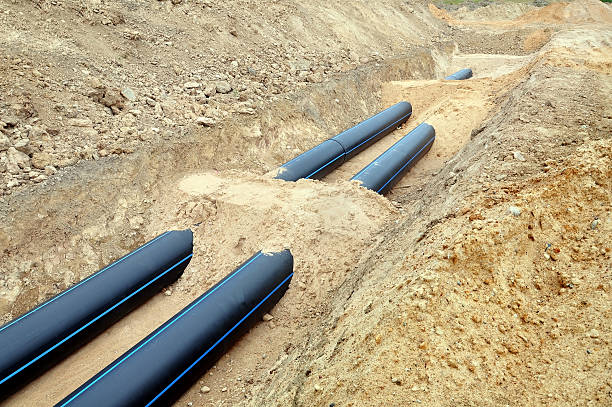In today’s infrastructure-driven world, manufacturers must deliver products that offer strength, longevity, and efficiency. Among the top choices in fluid and gas transportation, HDPE pipes stand out for their resilience and versatility. As demand rises across water, sewage, gas, mining, and industrial sectors, one company has solidified its position as a leading manufacturer of HDPE pipes and structures.
This manufacturer doesn’t just produce pipes—it engineers complete solutions for complex infrastructure challenges. By investing in high-grade materials, advanced extrusion technology, and precision welding techniques, the company ensures its HDPE pipes perform reliably under harsh environmental and industrial conditions.

A Reputation Built on Performance and Innovation
The company’s journey began with a clear mission: to redefine reliability in piping systems. From the start, it focused on high-density polyethylene due to its flexibility, impact resistance, and long life span. Over the years, the manufacturer expanded its product line, delivering not only HDPE pipes, but also customized manholes, chambers, tanks, and fittings.
Engineers working with this manufacturer trust its technical capabilities. Every pipe undergoes strict quality testing, including pressure, tensile, and leak tests. The company follows global standards such as ISO 4427, ASTM D3350, and EN 12201, ensuring its HDPE pipes meet the performance requirements of modern infrastructure projects.
Full-Service Approach to Custom HDPE Solutions
Unlike typical suppliers, this manufacturer provides complete end-to-end services—from design consultation to on-site technical support. Project developers across municipal, industrial, and agricultural sectors rely on the company’s expertise to select the right pipe grades, diameters, and wall thicknesses.
When a client needs a tailor-made solution, the company responds quickly. It produces large-diameter HDPE pipes for sewer and stormwater networks, as well as smaller-diameter options for residential water systems and irrigation. Its fabrication unit also constructs pre-assembled HDPE chambers and underground structures that speed up installation and reduce labor time.
High-Performance Features of HDPE Pipes
The manufacturer ensures its HDPE pipes excel in every area:
- Durability: Pipes last 50+ years under standard operating conditions.
- Corrosion Resistance: No rusting or scaling from chemical exposure.
- Flexibility: Handles ground movements and pressure surges without cracking.
- Leak-Free Joints: Advanced butt fusion and electrofusion methods create permanent, tight seals.
- Smooth Flow: Low friction interior reduces energy usage in pumping systems.
These advantages make HDPE pipes ideal for long-term, maintenance-free installations in water supply, wastewater, natural gas, and industrial waste systems.
Sustainability at the Core
The company leads the shift toward sustainable construction. It manufactures HDPE pipes using recyclable materials and low-energy processes. The light weight of HDPE reduces transportation emissions, and the long life cycle minimizes replacement and waste.
Clients across smart city and green building projects choose this manufacturer to support their sustainability goals. Many government tenders and industrial firms now specify HDPE as a preferred material, knowing it meets modern environmental criteria.
Global Reach, Local Focus
While the manufacturer exports to over 40 countries, it also maintains a strong local presence through regional warehouses and service hubs. It partners with installation contractors, government agencies, and developers to ensure projects meet tight deadlines without sacrificing quality.
Its trained support teams frequently visit sites to assist with pipe laying, welding, testing, and commissioning. This close collaboration results in better project outcomes and long-term relationships with clients who value performance and accountability.
Support for Efficient Installation
One of the company’s biggest strengths lies in its support during installation. It doesn’t just deliver HDPE pipes to the site and leave. Instead, it trains contractor teams on safe handling, proper fusion welding, and trench preparation. It also provides jointing machines, testing equipment, and detailed manuals to ensure each project runs smoothly.
Thanks to its comprehensive training programs, clients reduce the risk of installation errors that could lead to leaks or pipe damage. The result? Faster, safer, and more reliable infrastructure completion.
Ready for the Future
The company continues to invest in automation, smart manufacturing, and digital tracking systems. Clients can now track their HDPE pipes orders in real-time, request custom configurations online, and receive automated delivery updates.
As demand grows for durable, leak-free piping in sectors like desalination, renewable energy, and urban water management, this manufacturer stands ready to deliver. With a robust product line, expert support, and a focus on quality, it leads the global shift toward advanced HDPE infrastructure.
FAQ: Installing HDPE Pipes
Q1: What is the best method to join HDPE pipes?
You can use either butt fusion or electrofusion welding. Both create strong, leak-proof joints. Butt fusion is ideal for large-diameter pipes, while electrofusion works well in tight spaces or for repair work.
Q2: Do I need special tools to install HDPE pipes?
Yes, you will need fusion welding machines, pipe cutters, scrapers, and alignment clamps. The manufacturer often provides these tools or rents them as part of a complete installation package.
Q3: Can I bury HDPE pipes directly in the ground?
Yes. You must prepare the trench properly with clean backfill, maintain correct depth, and ensure pipe alignment before backfilling. HDPE’s flexibility helps it adapt to soil movement without cracking.
Q4: How long does the installation process take?
Installation time depends on pipe diameter and project complexity. However, HDPE pipes install faster than many other types due to their light weight and efficient jointing.
Q5: Is training required for installation crews?
Yes. Proper training ensures safe handling, correct welding, and successful pressure testing. The manufacturer offers on-site training sessions and certification programs to ensure quality workmanship.


















